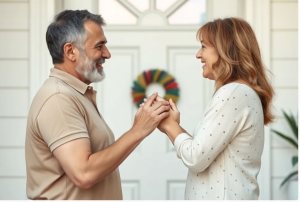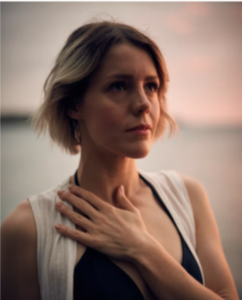We are obsessed with knowing. We demand answers to all our questions and confusions, answers to even the as-yet unanswerable. And, we demand that we find answers quickly, to save us from having to sit in the unknown. We’re taught from the earliest age that not knowing is bad, we’re bad, or at least not as good if we don’t know. When I was young, I remember turning away from certain careers because I couldn’t figure out how to do them before I had started doing them. We feel shameand inadequacy for not knowing, revealing a vulnerability that, while natural and legitimate, still makes us feel weak or defective, anxious for exposing our ignorance. We expect ourselves to know before we’ve even learned or experienced much of anything. As a result, we fake knowing, come up with answers that we haven’t earned and don’t really know, and thus end up feeling like and being imposters in our own lives.
Most of us learn early, as young children, that we’re supposed to know—supposed to be on top of life, understand it, control it, make it go our way. We’re supposed to have a plan and if we don’t, there’s something wrong with us; we need to work and try harder. When we don’t know, we feel vulnerable and unprepared; we’re failing at be one step ahead of life.
When we know the answers we feel safe and most importantly, in control. We have a plan, an idea, a certainty of mind. We are in charge. We’re most content when the mind is leading the way forward with a plan of action, a plan of its own making and certainty.
Furthermore, having the answers allows us to dodge out on the present moment, which is another one of our favorite pursuits. When we know the answers, have it all wrapped up if you will, we no longer have to be in the present moment; we don’t have to remain open to the ever-changing conditions and experiences that might guide our way. Once we know, we can turn away from now; our path is paved even if life changes that path or us as we go. We’re sticking with the plan; we’ve got the map so we can throw away the path. Knowing allows us to stop paying attention to what’s actually happening, the place where we actually are. Paying attention, staying fluid, is not needed because our mind has decided what is so and what will be. Thankfully, we’re done with now.
Most of the answers we come up with, particularly the ones that we rush into before really knowing, come from the mind, not the heart, gut, experience, or our deepest wisdom. We think our way into knowing. And, we feel more comfortable when the mind, the thinker, is in charge; we are most comfortable when we are a separate entity, a little head doing life. From its throne, the mind comes up with the answers and then steers our body and spirit around according to its plan, regardless of whether its plan matches our deeper truth.
What we’re really afraid of is to be in life, in step with it and not a step ahead of it, trying to control the way (as if we could). We’re afraid to leave life open, unresolved, to let life reveal its answers as we go, to be present in our life and not outside it, managing it, controlling it. We’re afraid to be vulnerable and not in charge, to surrender to the mystery of what we can’t yet know and may never know. When we live in the questions and stop trying to know what we don’t know, we’re choosing to pay attention to what’s happening now, our experience, and the choices we want to make given these truths. We’re agreeing to discover rather than know, based on what’s actually arising—not our predetermined idea of it; we’re forming a handshake with our experience, relaxing the reins and letting life show us the way. When we stop trying to know everything, we’re reassigning the CEO role in our life—from the mind to life itself, the truth, our experience, not the mind—whatever you want to call it, which can only tell us what we need to know as we go, and only if we will humble ourselves and listen. Living in the question, in essence, involves a shift from knowing to listening.
It turns out that the questions are a place we can indeed inhabit. We don’t know it, we’re taught not to know it, but we can in fact plant our feet right here in the not knowing. The first time someone suggested that I live with a question, I had no idea what that phrase meant, or perhaps more accurately, no idea how to embody that sentiment. Living meant knowing and so if I didn’t want to disappear or live with extreme anxiety, I had to solve the questions that were unsolved. Living and questions were contradictory. I needed sure ground, which for a younger me meant known ground. Known, not just for what was happening in the present moment, but known as to where I was headed, what was happening and to be done with what was happening.
But I can also remember the first time a friend told me that he didn’t know but was living in the question. Maybe it was a change in the verb or preposition he used, from live to living or with to in, or maybe (and more likely) it was my own evolution, the earned wisdom to know that I was not in control even if my mind told me I was. But with the aliveness of the word living and the inclusiveness of the word in, an undeniable sense of relief descended upon me, like an injection of relaxation, of presence. It felt like I had dropped through a trap door—into now, like I had been given permission to live here in what was true now, the not knowing now, and let the answers (if they came) reveal themselves to me. It gave me permission to not have to go out and make the answers happen or manufacture them from my mind. Living in the question meant that I could follow the truth as it unfolded. With permission to be in the question, I was offered residence in this moment; I could give up my delusion of control and better yet, my responsibility for being in control. Blessedly, I didn’t have to be in control. All that living in the question meant was agreeing to be awake and aware, to be present and discover the answers as I went, and, to stay open to the answers changing. Living in the question allows us to be in life, letting life guide us rather than our minds endlessly trying to steer life. Living in the question allows us to open to the infinite mystery, life unfolding in its own way, with us as part of it, along for the ride…to open to being part of a larger universe which is not in our charge.
When we don’t know, not knowing is the truth, anything else is made up, a way to try and feel safe, to control what feels uncontrollable at the moment. Living in the question, no matter how it feels, is living in the truth, which, once we get the hang of it, contains its own safety and trustworthiness. The safety and trustworthiness of the truth is not, however, gauged by what we usually gauge safety by, namely, solidness, knowability, and contents we like. But rather, the truth, the not knowing in this case, offers safety because of its inarguable-ness, its is-ness if you will; the safety of not knowing is unharmed by the fact that the situation is fluid, not solid, transforming and evolving, shifting beneath our feet. Living in the question means planting our feet in moving ground, accepting that we’re in a process without a known outcome, that the process is the destination, for now. In so doing, we’re also agreeing to be humble, to surrender our badge as master of the universe, to admit that we don’t have all the answers, that we await further clarity, to be offered by something larger than ourselves. Living in the question, while not familiar perhaps, ultimately, proves to be the most alive, fresh, and real place we can hope to inhabit. We thought courage meant knowing all the answers, but as it turns out, that answer itself was wrong. Courage means being willing to not grab for a mind-made shore when we’re genuinely at sea, to not shut life down and out with answers, but to simply keep living, here, in our humble not knowing, awake in the mystery. At the end of the day, our questions are our portals, the doorways through which we access now.



2 Responses
Great post thanks for sharing. Really sometimes we have to just let go and believe that everything will work fine. Thanks again
nice article and well described about human psychology towards life.